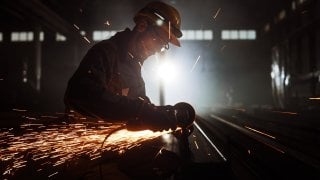How Japan Can Strengthen the U.S. Steel Industry
Blocking Nippon Steel’s investment would leave the U.S. steel industry more consolidated and less competitive against its Chinese rivals.
Election politics might have postponed a U.S. government decision about whether the Nippon Steel company’s planned acquisition of U.S. Steel creates a national security concern. However, this politically charged transaction will be in the spotlight again by December. Now is the time to think dispassionately about this nearly $15 billion mega-deal so that the interests of multiple stakeholders are protected. They include shareholders, workers, customers, suppliers, and local communities. Fortunately, aside from some political sensitivities, there are many potential benefits from this acquisition, and the national security risk is negligible. Lest this opportunity be lost, policymakers and community leaders must step up to make this case in the face of a skeptical and vocal United Steelworkers Union (USW).
U.S. Steel shareholders will clearly benefit from this sale to a Japanese firm, and over 98 percent of voting shareholders approved it in April. Nippon Steel’s all-cash offer was nearly double that of a rival bid by Cleveland-Cliffs, another major American steel manufacturer. Nippon Steel does not spend money recklessly, as it is by far the most profitable conventional steelmaker in the world for volume produced, so this generous offer is a sign of how much the company values U.S. Steel. And when a company values something, it invests to make it the best that it can be in terms of plant and workforce productivity.
In fact, Nippon Steel announced plans in August to invest $1 billion into U.S. Steel’s Mon Valley Works in Pennsylvania, in addition to $300 million at the Gary Works plant in Indiana. This is on top of a March pledge for $1.4 billion in U.S. Steel facility upgrades combined with promises for no plant closures, no layoffs, and cooperation with United Steelworkers (USW) labor union. All of this will benefit American steelworkers and the many workers at businesses that supply U.S. Steel. USW can say that Nippon Steel’s pledges are not sufficiently guaranteed, but an arbitration board with members selected, in part, by the union itself was apparently satisfied by Nippon Steel’s commitments and ruled in September that the acquisition could proceed.
It is worth reflecting on the legacy of Japanese auto investment in the United States since the 1990s. Investment from this corner proved a significant catalyst for American industrial revival in states like Ohio, Indiana, Tennessee, Kentucky, Texas, and others. Japanese brand automakers in the United States are still growing, with direct, intermediate, and spin-off employment topping 1 million American workers in 2022. This growth did not come at the expense of U.S. firms but was part of an overall recovery of U.S. auto manufacturing that resulted in historic gains for unionized auto workers in 2023. More steel production in the United States from multiple competitors will similarly stimulate innovation and benefit suppliers and customers alike.
But what about potential risks to national security? As someone who has spent thirty-five years working with the U.S. and Japanese governments and businesses at the nexus of commerce and national security, I can say that there is more risk to the United States from stopping this deal than from allowing it to proceed. The Committee on Foreign Investment in the United States (CFIUS) has indicated concerns about Nippon Steel’s commitment to maintain sufficient U.S. domestic production or that it might not support U.S. trade actions against foreign competitors in India or Brazil. However, Nippon Steel has agreed that U.S. citizens will make up the majority of the Board of Directors and the core of management for U.S. Steel. U.S. Steel will remain an American company owned by Nippon Steel North America, which has operated here for over fifty years and supported U.S. trade actions, most recently in September on imports of corrosion-resistant steel from ten countries.
Japanese firms are not corporate raiders, and they focus on long-term relationships. Nippon Steel is investing a lot of money in U.S. Steel to expand its capacity to produce steel in the United States, which is the expressed goal of past protectionist or industrial policies. Nippon Steel’s investment is the fruit of these efforts and should be welcomed as a win. If the deal is turned aside instead on dubious national security worries or USW’s bad experiences with U.S. Steel management in the past, it would be a self-inflicted wound that could discourage future foreign investment and damage one of America’s most trusted alliances and valuable economic relationships.
Blocking Nippon Steel’s investment would leave the U.S. steel industry more consolidated and less competitive against the Chinese behemoths that produce over half of the world’s steel. Conversely, simply allowing this commercial transaction to proceed would bring significant economic benefits to many and help strengthen the American steel industry for decades to come. It is important to make this case now so that the best decision for most Americans can be made as soon as possible. This should include encouraging more direct dialogue between USW and Nippon Steel in Tokyo. Even as U.S. Steel remains an American company, a positive USW-Tokyo relationship can help underpin a long-term alliance.
James L. Schoff is senior director of the “U.S.-Japan NEXT Alliance Initiative” at the Sasakawa Peace Foundation USA (based in Washington, DC). Previously, Schoff was a senior fellow and director of the Japan Program at the Carnegie Endowment for International Peace for nine years, following two years as senior adviser for East Asia policy at the U.S. Office of the Secretary of Defense. His publications include “Allied on AI Assurance: Technology to Enhance AI Security & Safety” (Sasakawa USA, October 2024), “Modernizing U.S.-Japan Command & Control Relationships for New Challenges” (Sasakawa USA, May 2023), “China and the New Role for Economic Security in the US-Japan Alliance” (Sasakawa Peace Foundation, April 2022), and “Uncommon Alliance for the Common Good: The United States and Japan after the Cold War” (Carnegie, 2017).
Image: Gorodenkoff / Shutterstock.com.

